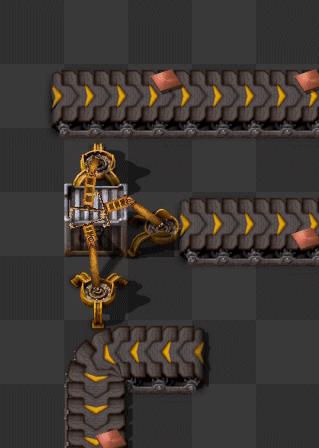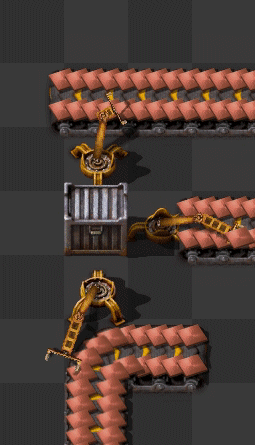User:Fried biter/workspace
作業場/workspace 日本語話者の方、マサカリ投げてくださると助かります
あの黄色い電動インサータについては、インサータをご覧ください.
インサータ(Inserters)は短距離間で物を動かすための装置。設置された状態では固定の向きを持つ。後ろからアイテムをとって、前に置く能力を持つ。そうすることで、アイテムを一方の搬送ベルトから別のベルトに移したり、ストレージ装置にアイテムを出し入れしたりできる。
インサータの種類
| Burner inserter | 燃料で動く唯一のインサータ。 |
| Inserter | 基本的な電動インサータ。 |
| Long handed inserter | より長い距離間でアイテムを出し入れできる。 |
| Fast inserter | インサータより高速。 |
| Filter inserter | 高速インサータのバリエーションで、アイテムのタイプでフィルタリングできる。 |
| Stack inserter | 高速インサータ並みに速いが、一度により多くのアイテムを動かせる。 |
| Stack filter inserter | スタックインサータのバリエーションで、アイテムのタイプでフィルタリングできる。 |
機構
インサータは以下をします。
- 地面、搬送ベルト、チェスト、炉、組立機を含むストレージ空間を持つ任意のオブジェクトからアイテムを拾う。
- 地面、搬送ベルト、ストレージ空間を持つ任意のオブジェクトにアイテムを置く。
- エネルギー不足の際は低速で動作する。
- そのスタックサイズが許す限り多くのアイテムを一度に拾う。ただそのためにあまり長くは待たない。
インサータは以下をしません。
- その隣接するエンティティには入れられないアイテムを拾う。
- インベントリが一杯のエンティティに入れるためにアイテムを拾う。
- 同じ地面タイルに同時に複数のアイテムを置く。
- 例えばフィルタやスロット制限のためアイテムを保持できないエンティティに、アイテムを置く。
- ボイラー、原子炉、、炉、タレットのインベントリを満たす。
2個以上のインサータが同じタイルから拾う場合、それらを最も速く掴めるインサータが最初に掴む。高速なインサータの他にも、搬送ベルトの内側レーンから拾うインサータに有利となる。
インサート制限
インサータがどこにアイテムを動かすかにもよるが、常に対象のインベントリを満たしてしまうというようなことはない。これにより他のインサータと同じ搬送ベルトからアイテムを共有できる。例えば、ボイラーが5個以上のアイテムを燃料として保持している間、インサータは追加の燃料を供給しない。これにより残りの燃料が搬送ベルト下流に流れてゆく。燃料が5アイテムを切ったら、インサータは燃料のインサートを5アイテムになるまで再開する。
| エンティティ | アイテムタイプ | 自動インサート制限 |
|---|---|---|
| ボイラー、燃料式掘削機、炉、原子炉 | 燃料 | 5 |
| ガンタレット | 弾倉 | 10 |
| 長距離砲タレット | 長距離砲弾 | 5 |
| 組立機、炉、遠心分離機、化学プラント、原油精製所 | レシピに応じたアイテム | 製作1回分に加えて、インサータが1スイングしきるまでに製作可能な分の材料。最小2セット、最大100セット |
| 研究所 | サイエンスパック | 研究1単位に必要なサイエンスパック数の倍 |
An inserter that has a higher inserter capacity bonus than 1 can overfill the target building, due to the inserter picking up a higher amount of items than needed. Overfilling can also occur if multiple inserters are used to insert items into one building.
Inserters and transport belts
Transport belts have two lanes on which items can travel. Inserters only place items onto one side of the belt, either the far side from the inserter's perspective or if the belt is going the same or the opposite direction as the inserter the right side from the belt's perspective.
Potential issues
Inserters may have problems picking up items:
- From very fast belts, because the items are moving too quickly.
- From the entry or exit of an underground belt (because the time they have to pick up is shorter)
- From turning belts if the item is on the inside of the corner
Power usage
- Electric inserters drain energy even when they are not moving, as idle power
- The amount of energy used is the same for every turn
- The burner inserter does not drain energy when idle, but uses more energy when it is active.
Inserter speed
| Type | Rotation-speed (turns per Game-tick) Extension-speed (Tiles per Tick) |
Turns per Game-second Tiles per Game-second |
Game-second per full turn Game-seconds per Tile |
Ticks per full turn Ticks per Tile |
|---|---|---|---|---|
| Burner inserter | 0.01 0.0214 |
0.59 1.284 |
1.7 0.833 |
102 76 |
| Inserter | 0.014 0.03 |
0.83 1.8 |
1.2 0.56 |
72 54 |
| Long handed inserter | 0.02 0.0457 |
1.15 2.742 |
0.867 0.416 |
52 36 |
| Fast inserter Stack inserter Stack filter inserter |
0.04 0.07 |
2.31 4.2 |
0.433 0.238 |
26 24 |
Rotation Speed
Convention: 2π rad = 100% of a circle rotation = 1 turn (or one full rotation).
Note: an Inserter doesn't always need to make full turns. When grabbing from a transport belt, it is slightly faster when grabbing items from the closest lane.
Extension Speed
The extension-speed is normally not visible (only when compared to other inserters), but there are measurable speed differences when taking - for example - from the near or the far side of a belt. Also Some mods can alter the pickup and drop locations of inserters, making this stat more relevant.
Inserter Throughput
The following is based on experimental data gathered in version 0.15.
Inserter throughput between chests and other stacks is a simple function of stack size and arm speed:
n = Stack size
t_arm = Time to move the arm back and forth
Time per item = t_arm / n
Throughput (items/sec) = 1 / Time per item = n / t_arm
When moving items to or from belts, the time to pick up or put down items also becomes a factor:
t_item = Time to pick up or put down one item
t_cycle = Time to complete an arm cycle = t_arm + n*t_item
Time per item = t_cycle / n = t_item + t_arm / n
Throughput (items/sec) = 1 / (t_item + t_arm / n)
Note: Before 0.15.14, inserters were 1-4% less efficient when moving items from south to north.
Chest to chest
| Type | Arm cycles per second | Items/second at capacity bonus level (stack size) | |||||
|---|---|---|---|---|---|---|---|
| No capacity bonus | Capacity bonus 2 | Capacity bonus 7 | |||||
| Burner inserter | 0.59 | 0.59 | (1) | 1.18 | (2) | 1.76 | (3) |
| Inserter | 0.83 | 0.83 | (1) | 1.67 | (2) | 2.50 | (3) |
| Long handed inserter | 1.15 | 1.15 | (1) | 2.31 | (2) | 3.46 | (3) |
| Fast inserter Filter inserter |
2.31 | 2.31 | (1) | 4.62 | (2) | 6.93 | (3) |
| Stack inserter Stack filter inserter |
2.31 | 4.62 | (2) | 9.23 | (4) | 27.70 | (12) |
Chest to belt
Throughput going from chest to belt depends on how full the belt is and how the items are spaced, i.e. if spaces are large enough to fill with items. Underground entrances and exits also makes it easier for the inserter to put down an item.
In these measurements inserters move items onto an empty perpendicular belt. Values are given for the stack sizes at three different capacity bonus levels.
| Type | Items/second at capacity bonus level (stack size) | |||||||||||
|---|---|---|---|---|---|---|---|---|---|---|---|---|
| No capacity bonus | Capacity bonus 2 | Capacity bonus 7 | ||||||||||
 |
 |
 |
 |
 |
 |
 |
 |
 |
||||
| Burner inserter | 0.59 | 0.59 | 0.59 | (1) | 1.10 | 1.13 | 1.14 | (2) | 1.53 | 1.62 | 1.67 | (3) |
| Inserter | 0.83 | 0.83 | 0.83 | (1) | 1.52 | 1.58 | 1.60 | (2) | 2.05 | 2.22 | 2.31 | (3) |
| Long handed inserter | 1.15 | 1.15 | 1.15 | (1) | 2.03 | 2.14 | 2.18 | (2) | 2.65 | 2.95 | 3.10 | (3) |
| Fast inserter Filter inserter |
2.31 | 2.31 | 2.31 | (1) | 3.64 | 4.00 | 4.14 | (2) | 4.29 | 5.14 | 5.63 | (3) |
| Stack inserter Stack filter inserter |
3.64 | 4.00 | 4.14 | (2) | 4.71 | 6.15 | 6.86 | (4) | 5.90 | 9.60 | 12.20 | (12) |
To calculate the throughput for Stack inserter and Stack filter inserter at any capacity level, you can use these linearly fitted factors with the belt/chest throughput formula above:
| Type | Transport belt | Fast transport belt | Express transport belt | |||
|---|---|---|---|---|---|---|
| t_item | t_arm | t_item | t_arm | t_item | t_arm | |
| Stack inserter Stack filter inserter |
0.142 | 0.292 | 0.073 | 0.360 | 0.049 | 0.384 |
See the source spreadsheet for the corresponding factors for the other inserter types. Their errors are generally well below 1%.
Belt to chest
When picking items from a belt, many more factors come into play besides belt fullness:
- How fast the items move (i.e. if they are queued up on the belt or move at belt speed).
- Whether the belt is perpendicular to the inserter or approaches it head on.
- Whether items are on the near or far lane of a perpendicular belt.
- Whether the belt turns or not, and whether the items are in the inner or outer side of the bend.
- If the belt is an underground entrance or exit. This shortens the time items are visible to the inserter for pickup.
- All sorts of intricate timing factors between the inserter and the items on the belt, since the game simulates the arm homing in on every item.
The test setup used below is with an inserter taking items from a perpendicular belt with items on the far lane only. The belt is fully compressed and timings are both for items that move at full speed and queued up as much as possible. Values are given for the stack sizes at three different capacity bonus levels.
| Type | Items/second at capacity bonus level (stack size) | ||||||||||||||
|---|---|---|---|---|---|---|---|---|---|---|---|---|---|---|---|
| No capacity bonus | Capacity bonus 2 | Capacity bonus 7 | |||||||||||||
| Items at belt speed |
Items queued up |
Items at belt speed |
Items queued up |
Items at belt speed |
Items queued up |
||||||||||
 |
 |

|
 |
 |

|
 |
 |

| |||||||
| Burner inserter | 0.56 | 0.56 | 0.51 | 0.65 | (1) | 1.11 | 1.07 | 0.98 | 1.18 | (2) | 1.43 | 1.54 | 1.43 | 1.75 | (3) |
| Inserter | 0.83 | 0.74 | 0.77 | 0.90 | (1) | 1.57 | 1.48 | 1.45 | 1.62 | (2) | 2.00 | 2.11 | 2.07 | 2.40 | (3) |
| Long handed inserter | 1.16 | 1.11 | 1.11 | 1.22 | (1) | 2.22 | 2.22 | 2.11 | 2.31 | (2) | 3.08 | 3.08 | 3.16 | 3.33 | (3) |
| Fast inserter Filter inserter |
2.22 | 2.22 | 2.14 | 2.40 | (1) | 4.17 | 3.81 | 4.00 | 4.29 | (2) | 5.71 | 5.45 | 5.46 | 6.21 | (3) |
| Stack inserter Stack filter inserter |
4.17 | 3.81 | 4.00 | 4.29 | (2) | 6.67 | 6.67 | 6.15 | 6.67 / 7.50 / 7.74 * |
(4) | 6.67 | 10.00 | 12.00 | 6.67 / 11.61 / 13.58 * |
(12) |
*) Throughput for basic/fast/express belt.
Since there are many more factors involved, these measurements exhibit a more complex pattern than chest-to-belt.
- Boldface cells show for which belt each inserter has the best throughput on each bonus level when items move at belt speed. Higher speed belts mean that inserters have to work harder to catch the fast moving items. The effect is most noticeable for slower inserters and smaller stack sizes.
- When items are queued up the belt type hardly matters, so there is only a single column for that. The exceptions are the stack inserters - for basic transport belts it's the belt that sets the limit for stack sizes above 4, and there is also a notable difference between fast and express belts.
Here are linearly fitted factors to get the Stack inserter and Stack filter inserter throughput at any capacity level, by using the belt/chest throughput formula above:
| Type | Transport belt | Fast transport belt | Express transport belt | |||
|---|---|---|---|---|---|---|
| t_item | t_arm | t_item | t_arm | t_item | t_arm | |
| Stack inserter Stack filter inserter |
0.045* | 0.403* | 0.063 | 0.387 | 0.049 | 0.416 |
*) Since the belt is the limiting factor above stack size 4, these figures are only accurate up to that size. More than that and the throughput is fixed at 6.67 items per second.
See Also
- Electric system
- Belt transport system
- Inserter capacity bonus (research): Inserter moves more than an item per turn.

